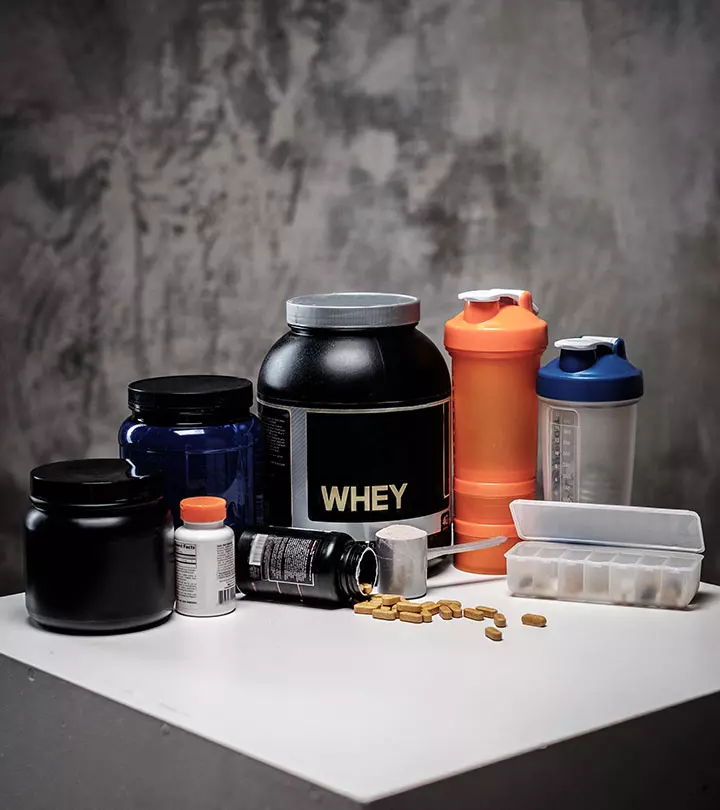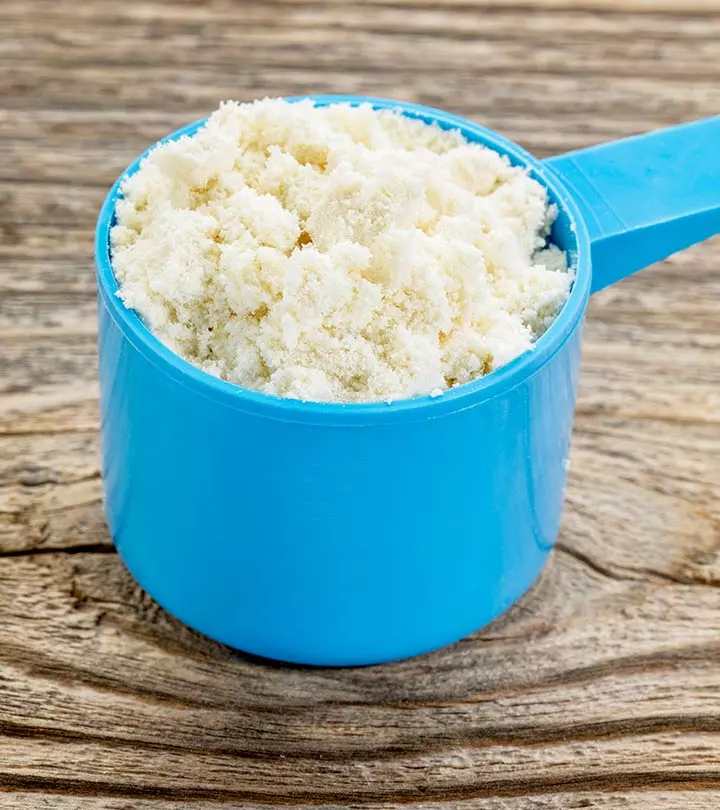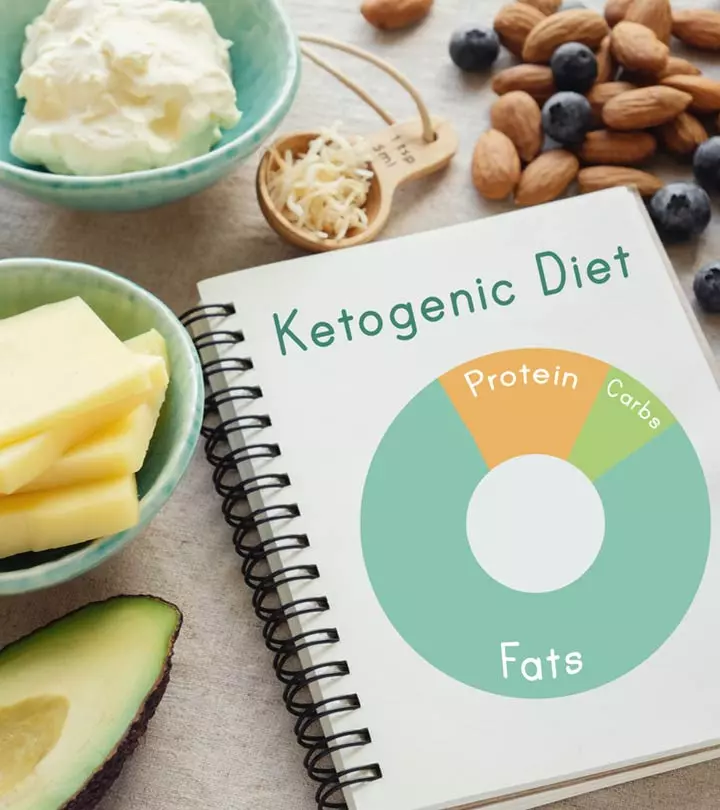The 12 Side Effects Of Protein Supplements You Should Be Aware Of
Consuming excessive supplements may not be as safe and good for you as you think.

Image: Shutterstock
The side effects of protein supplements may make you hesitate before taking them. Protein supplements help meet the body’s daily protein requirements. In addition, they are convenient to consume. However, excessive intake of protein supplements often leads to health problems, such as insomnia, constipation and gas. The protein supplement industry remains largely unregulated, leaving consumers to exercise their own caution. Many products may contain undisclosed ingredients, additives, and varying protein levels that could potentially affect anyone’s health. It is essential to select reputable brands and be mindful of the contents of the supplements you consume. This article examines the side effects of protein supplements, their safety, and any potential drug interactions. Read on.

 Know The Flip Side: Protein Supplements
Know The Flip Side: Protein SupplementsShort-Term Effects
Lower blood pressure, erectile dysfunction, diminished libido, and enlarged breasts in men due to hormonal imbalance, dehydration, and acne.
Long-Term Effects
Unhealthy weight gain, liver function impairments, and renal disorders.
Drug Interactions
Whey protein may interact with osteoporosis medication, anti-platelet medication, anti-coagulant drugs, and NSAIDs.
When To See A Doctor
Before buying protein supplements.
In This Article
What Are Protein Supplements?
Protein supplements are designed to serve as an additional source of or counter the lack of protein, a vital macronutrient essential for the body’s growth, repair, and maintenance. These supplements are available as powders, bars, or shakes, and are commonly used by athletes, bodybuilders, and individuals seeking to increase their protein intake.
Protein supplements often contain whey, casein, soy, pea, or rice protein, and they can be derived from animal or plant sources. Athletes use them to support muscle recovery after workouts, enhance muscle mass, and improve their overall athletic performance. In addition, individuals with dietary restrictions often use protein supplements to meet their daily protein requirements. These supplements are usually consumed alongside a balanced diet and regular physical activity.
Even though they are essential, they may cause certain side effects that you need to keep in mind. Check out what they are below.
Key Takeaways
- While protein is essential for all bodily processes, consuming a high-protein diet can also cause dehydration; therefore, it is recommended to increase your water intake when on such diets.
- If you already take blood pressure medication, excessive whey protein consumption can be harmful.
- Whey and casein protein supplements are milk-based, making them rich in lactose. Thus, lactose intolerant people should steer clear of these.
- High consumption of protein can lead to impaired kidney function and increased risk of cancer.
What Are The Side Effects Of Protein Supplements?
1. Upset Digestive System

An upset digestive system is one of the most commonly observed side effects of protein powder. The two most popular protein supplements — whey protein and casein protein — are derived from milk. These are rich in lactose, which is a type of sugar naturally found in milk. Therefore, it is not a good choice for those who are lactose intolerant.
Excess intake of these proteins can also cause increased bowel movements, bloating, and even nausea (1). Some of its other side effects include flatulence, stomach pain, and diarrhea.
 Trivia
Trivia2. Cause Unhealthy Weight Gain
This side effect beats the very purpose of inventing protein supplements in the first place! If taken in excess quantities, protein supplements can lead to increased appetite and cause you to gain weight. And by weight, we mean fat. When your workout regimen does not match up to your protein intake, the unutilized calories get converted into fat. This fat gets piled up day by day, causing you to gain weight rapidly. It is surely not a good sign.
 Quick Tip
Quick Tip3. Can Lower Blood Pressure Too Much

Research shows that whey protein especially can lower blood pressure (2). Though this can be good news in most cases, people who already are on medications for high blood pressure must be wary as whey supplements might lower their blood pressure too much.
4. Might Affect Kidneys
As protein is utilized by the body, it produces ammonia as a by-product. The ammonia is then converted into urea, which is eliminated from the body through urine. The logic is simple. If a person takes high amounts of protein, they produce large quantities of urea (3). It puts higher pressure on the kidneys as they filter out copious amounts of urea and calcium from the blood, causing kidney damage.
When large quantities of protein supplements are consumed over a long period, there is an increased risk of developing renal disorders. Impairment of kidneys, kidney stones, and renal failure are the probable side effects of taking protein supplements in excess quantities.
5. Can Disrupt Hormones

Hormonal disruption is the major issue when it comes to soy-based protein supplements. While soy is rich in essential amino acids and is considered one of the foods high in amino acids, it is also loaded with phytoestrogen (4). Phytoestrogen, when ingested, mimics the estrogen hormone and can send your endocrine system on a roller coaster ride. Not to mention the fact that up to 95% of soy used to make protein supplements is genetically modified. The genetically modified soy contains a chemical called glyphosate, which is responsible for hormonal imbalance, miscarriage, and even birth defects in newborns. The daidzeini Naturally occurring compound found chiefly in soybeans and legumes that helps reduce oxidative stress (imbalance between the production and detoxification of reactive oxygen). and genisteini Naturally occurring compound in dietary vegetables, it can help reduce the risk of cardiovascular diseases, osteoporosis, hot flashes, and vaginal dryness. found in soy can cause erectile dysfunction, diminished libido, and enlarged breasts in men.
6. May Cause Liver Damage
Having a diet of protein supplements, with no carbs, can push the body to the state of ketosis, wherein the body utilizes fat as the primary source of energy. This leads to high blood acidity levels. Consistent high blood acidity is known to impair liver function and may result in severe liver disorders.
Also, taking excess whey protein without exercising can lead to liver inflammation and increase the risk of serious liver injury (5). This is one of the potential side effects of whey protein.
7. Can Lead To Heavy Metal Poisoning
One journal by Consumer Reports indicated that protein powders are laced with harmful heavy metals like arsenic and lead (6). Needless to say, prolonged consumption of excess protein supplements can make you sick. A person gorging on protein supplements can experience headaches, dizziness, exhaustion and other issues – more so if they have diabetes symptoms or suffer from chronic kidney conditions (7).
8. Drug Interactions
It would be extremely wise of you not to consume whey protein if you are on medication for osteoporosisi A form of arthritis in which the protective tissues lining bone joints wear down gradually and worsen over time. – as it might decrease the absorption of the drug (8). Whey protein can also interact with anti-platelet medications, anti-coagulanti Blood thinners that are chemical substances helping prevent blood clots and prolong the blood clotting time. drugs, and NSAIDs (Non Steroidal Anti-Inflammatory Drugs), thereby increasing the risk of bleeding.
There is a long list of drug interactions, which one must study before embracing the protein supplement fad. A supervised, recommended intake of protein supplements is okay. The problems set in when you go overboard. The best way forward is to consult your physician before stacking your kitchen shelf with jars of expensive protein supplements.
9. May Increase Cancer Risk
The probable heavy metals in certain protein powder brands can increase cancer risk (9). But this is just a vague possibility. Other studies suggest how whey protein can reduce tumor size and prevent cancer proliferation. Hence, consult your nutritionist in this regard.
10. May Cause Dehydration

Research shows that high-protein diets can make one dehydrated. This is one reason people on high-protein diets must drink a lot of water (10).
11. Can Cause Acne
Whey protein is known to increase the production of a hormone called IGF-1, or insulin-like growth factor (11). This can trigger sebum production and lead to acne.
12. Can Lead To Hair Loss

Our hair is made of keratin, which is a protein. So, it only makes sense to gorge on more protein, right? Well, maybe not. This is because whey protein is also known to boost testosterone levels, which produce a chemical called DHT in the bloodstream. This chemical can often cause hair loss.
This simply means that it is not protein but the chemical that is produced in the process that causes hair loss. Even lifting excess weights can lead to an increase in testosterone levels and subsequent hair loss. Hence, you must also focus on aerobic exercise.
So, before beginning any protein supplementation, it is advisable to seek the guidance of a healthcare professional. This will help determine if protein supplementation is suitable for your specific health needs and dietary objectives.
One of the best ways to avoid unwanted side effects is knowing how to safely choose a protein supplement that suits your body and lifestyle. Scroll down to know more.
How To Choose Protein Supplements Safely?
- Calculate your protein requirements based on your age, weight, degree of activity, and fitness objectives.
- Choose supplements that contain little to no artificial sweeteners, fillers, or additives. Choose low-sugar or naturally sweetened products, such as those made with monk fruit or stevia.
- If you are sensitive to lactose, soy, or gluten, avoid items containing these allergens. Look for any allergen warnings on the label or check the ingredients list before buying a product.
- Buy supplements that mostly contain natural ingredients.
- Select a protein powder that is low in calories and carbohydrates if you want to lose weight.
- If you have any pre-existing health conditions, consult a doctor or dietitian to ensure the supplement is safe.
Infographic: 6 Unpleasant Side Effects Of Protein Supplements
Protein supplements are quite the rage amongst fitness enthusiasts and bodybuilders, but they can have quite a few unwanted effects on the body. Check out the infographic for six such side effects that are definitely unpleasant so that you can weigh the pros and cons well before using them. Scroll down.
Some thing wrong with infographic shortcode. please verify shortcode syntax
Protein supplements help your body meet its daily dose of protein. Protein is considered the building block of life and it coordinates many body functions. However, excess intake of protein supplements may cause many side effects and allergic reactions. For example, overconsumption may cause indigestion, increased bowel movements, bloating, flatulence, diarrhea, cramps, mood swings and weight gain. It also may lower blood pressure way too much, cause heartburn and fatigue, worsen arthritis-related joint pain, affect kidneys, and even interact with certain drugs. Hence, take protein supplements in limited quantities to avoid any adverse reactions.
Do you use protein supplements? Have you experienced any of these side effects? Do share with us in the comments section below.
Frequently Asked Questions
Is 200 g of protein too much?
Marie Latulippe, MS, MBA, RDN, and Director of Science Programs at IAFNS, says, “The Dietary Reference Intake level for protein set by the Food and Nutrition Board is 0.8 grams per kilogram of body weight. This means that a 150-pound (68 kg) individual would consume approximately 54 grams of protein per day. Individuals that are more physically active may benefit from more protein, and there is some individual variability in what may be optimal. However, it is safe to say that for a healthy individual with an average level of physical activity, 200 grams of protein per day may be high.”
What is the safest form of protein?
According to Latulipper, “Protein is generally not unsafe to consume for a healthy individual in recommended amounts. It is advisable to obtain protein from a variety of sources, that is, not entirely from a powder or other “supplemental” source.”
She adds, “Individuals with specific protein allergies should avoid foods containing those proteins. For e.g., in the case of “peanut allergies”, all foods containing these proteins should be avoided. In addition, individuals whose doctor has instructed to limit protein, such as those with compromised kidney function, should limit protein intake in alignment with those medical recommendations.”
How can you remove excess protein from the body?
Hydration is key. Water can help flush out the excess protein from your system. And if you are already taking whey protein supplements, ensure you include more of low-protein foods in your diet. That way, you can avoid an excess of protein.
What is the ideal dosage of protein?
The average person can take 0.8 to 1.3 grams of protein for every kilo of body weight. Which means that if you weigh 65 kilos, your ideal protein intake can be anywhere between 52 grams to 84 grams per day. Remember to maintain a balance. Don’t go overboard.
How can we reduce the side effects of protein supplements
Consume the supplements in doses recommended by your nutritionist to reduce their side effects.
Is protein powder necessary?
You may not need a protein powder supplement if you are already consuming enough protein-rich foods. Otherwise, you may consider going for one after consulting your healthcare provider.
How can I get enough protein without protein powder?
You can get enough protein from eggs, cheese, Greek yogurt, chicken breast, tuna, turkey breast, broccoli, etc.
How often should I supplement with protein powder?
You may supplement with protein powder once or every few days. However, ensure you also follow a healthy diet.
Learn about the potential side effects of bodybuilding supplements and discover what to look out for. Check out the video given below for more information.
References
Articles on StyleCraze are backed by verified information from peer-reviewed and academic research papers, reputed organizations, research institutions, and medical associations to ensure accuracy and relevance. Read our editorial policy to learn more.
- WHEY AND WHEY-BASED FRUIT BEVERAGE
https://www.researchgate.net/publication/354030758_WHEY_AND_WHEY-BASED_FRUIT_BEVERAGE - Whey protein lowers blood pressure and improves endothelial function and lipid biomarkers in adults with prehypertension and mild hypertension: results from the chronic Whey2Go randomized controlled trial
https://www.ncbi.nlm.nih.gov/pmc/articles/PMC5118733/ - Dietary protein intake and renal function
https://www.ncbi.nlm.nih.gov/pmc/articles/PMC1262767/ - The pros and cons of phytoestrogens
https://www.ncbi.nlm.nih.gov/pmc/articles/PMC3074428/ - Usage of whey protein may cause liver damage via inflammatory and apoptotic responses
https://pubmed.ncbi.nlm.nih.gov/25352651/ - Arsenic, Lead Found in Popular Protein Supplements
https://www.consumerreports.org/dietary-supplements/heavy-metals-in-protein-supplements/ - The Effects of High-Protein Diets on Kidney Health and Longevity
https://pubmed.ncbi.nlm.nih.gov/32669325/ - The effects of a two-year randomized, controlled trial of whey protein supplementation on bone structure, IGF-1, and urinary calcium excretion in older postmenopausal women
https://asbmr.onlinelibrary.wiley.com/doi/full/10.1002/jbmr.429 - A human health risk assessment of heavy metal ingestion among consumers of protein powder supplements
https://pmc.ncbi.nlm.nih.gov/articles/PMC7509468/ - Controversies Surrounding High-Protein Diet Intake: Satiating Effect and Kidney and Bone Health
https://www.ncbi.nlm.nih.gov/pmc/articles/PMC4424780/ - Acne and whey protein supplementation among bodybuilders
https://pubmed.ncbi.nlm.nih.gov/23257731/
Read full bio of Cheryl Mussatto
- Marie Latulippe, MS, RDN, is the Director of Science Programs with IAFNS. She has nearly 20 years of experience in addressing emerging nutrition issues and application of evidence to policy development. She previously served as Study Director for the Review of Special Supplemental Nutrition Program for Women, Infants and Children (WIC) Food Packages at the National Academies’ Food and Nutrition Board.
 Marie Latulippe, MS, RDN, is the Director of Science Programs with IAFNS. She has nearly 20 years of experience in addressing emerging nutrition issues and application of evidence to policy development. She previously served as Study Director for the Review of Special Supplemental Nutrition Program for Women, Infants and Children (WIC) Food Packages at the National Academies’ Food and Nutrition Board.
Marie Latulippe, MS, RDN, is the Director of Science Programs with IAFNS. She has nearly 20 years of experience in addressing emerging nutrition issues and application of evidence to policy development. She previously served as Study Director for the Review of Special Supplemental Nutrition Program for Women, Infants and Children (WIC) Food Packages at the National Academies’ Food and Nutrition Board.
Read full bio of Ravi Teja Tadimalla
Read full bio of Arshiya Syeda
Read full bio of Aparna Mallampalli



























Community Experiences
Join the conversation and become a part of our empowering community! Share your stories, experiences, and insights to connect with other beauty, lifestyle, and health enthusiasts.